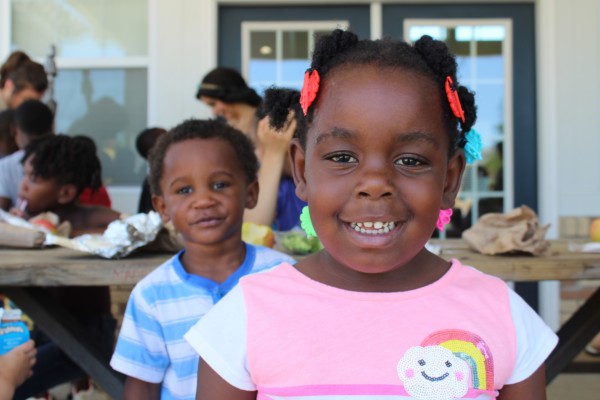 To promote social distancing and slow the spread of COVID-19, school closures started across the nation in mid-March. In the wake of millions of students losing access to school meals, and an economic downturn, child hunger has soared in the United States. Feeding America estimates that 6.8 million additional children will experience food insecurity in the United States due to the pandemic. This would bring the total number of children facing food insecurity to 18 million, or 1 in 4 children. According to Brookings, nearly 5 times as many single mothers with young children report their children don’t have enough to eat compared to 2018.
To promote social distancing and slow the spread of COVID-19, school closures started across the nation in mid-March. In the wake of millions of students losing access to school meals, and an economic downturn, child hunger has soared in the United States. Feeding America estimates that 6.8 million additional children will experience food insecurity in the United States due to the pandemic. This would bring the total number of children facing food insecurity to 18 million, or 1 in 4 children. According to Brookings, nearly 5 times as many single mothers with young children report their children don’t have enough to eat compared to 2018.
Summer Feeding Amid a Pandemic
Amid growing child hunger, getting nutrition to children this summer matters more than ever. In a pre-COVID-19 world, the end of the school year marked when food banks and summer feeding sponsors started gearing up operations to provide nutrition to children throughout the summer – a time that is usually already rife with child food insecurity. From the implementation of non-congregate meal distributions to working with a unique set of community partners, food banks and summer feeding sponsors are developing creative solutions to ensure children and families continue to have access to meals this summer.
Program flexibilities and waivers – both nationwide and approved on a state-by-state basis – authorized by Congress and implemented by the United States Department of Agriculture Food and Nutrition Service (USDA-FNS) have been instrumental in allowing innovative designs to ensure children have the nutrition they need to learn and grow during this summer. The flexibilities and waivers have also broken down the regulatory barriers and challenges that sponsors have encountered during previous summer nutrition operations – challenges further exacerbated in this pandemic.
These program flexibilities and waivers include:
- Non-Congregate Feeding: has allowed for the off-site consumption and distribution of meals for children during this time. Sponsors have implemented grab-and-go models, mobile distributions, and other creative solutions in order to ensure children have access to summer meals during the pandemic
- Parent/Guardian Meal Pick-Up: has allowed for parent/guardians to pick up multiple meals at a time for their children (without needing their children present) in a safe and socially distant environment
- Meal Pattern Flexibility: has allowed for sponsors to have flexibility in preparation and distribution of meals that would normally, pre-COVID, meet the meal pattern requirements in order to minimize potential exposure
For more information and updates on child nutrition flexibilities during COVID-19, including these and others, please visit our Feeding America Action page for further guidance and waiver updates.
The Role of Pandemic EBT
In addition to program flexibilities and waivers, Pandemic EBT (P-EBT) is a state opt-in opportunity that provides nutritional resources to families who have lost access to free or reduced-price school meals due to nationwide school closures. P-EBT gives families additional benefits (around $5.70 per day per student). Families receiving P-EBT benefits can still access meals from summer feeding sites, and this program is not considered in the public charge test for participating immigrant families.
As of the writing of this blog, only one state has yet to be approved and many other states continue to roll out benefits to eligible families covering the time period of spring school closures. You can find the most recent P-EBT updates on USDA’s FNS website here.
P-EBT was scheduled to expire in June without the legislative fix needed to continue these vital benefits through the summer and into the next school year as needed given the continued disruption to school schedules. Feeding America supports the extension and expansion of P-EBT in future legislation. We encourage our allies to:
- Support a legislative fix to extend and expand P-EBT;
- Ensure families know P-EBT is available regardless of immigration status (see here);
- Encourage families to fill out P-EBT applications, if they’re required in your state; and
- Tell us about the impact of P-EBT to help us advocate for permanent Summer EBT in every state.
The Role of the Supplemental Nutrition Assistance Program
In addition to P-EBT benefits, we also recognize the important role the Supplemental Nutrition Assistance Program (SNAP) plays in supporting children and families. As the nation’s first line of defense against hunger, SNAP benefits respond quickly and efficiently to both support families and boost local economies. We continue to advocate for a 15 percent increase in the maximum benefit in SNAP in order to ensure children and families facing hunger have access to needed nutrition.
Especially as COVID-19 continues to widen the already inequitable distribution of food insecurity, it is critical that we work together to help ensure children and families receive access to nutritious meals this summer. Let us build awareness, collaboration, advocacy, and programmatic efforts to ensure no child goes hungry!



